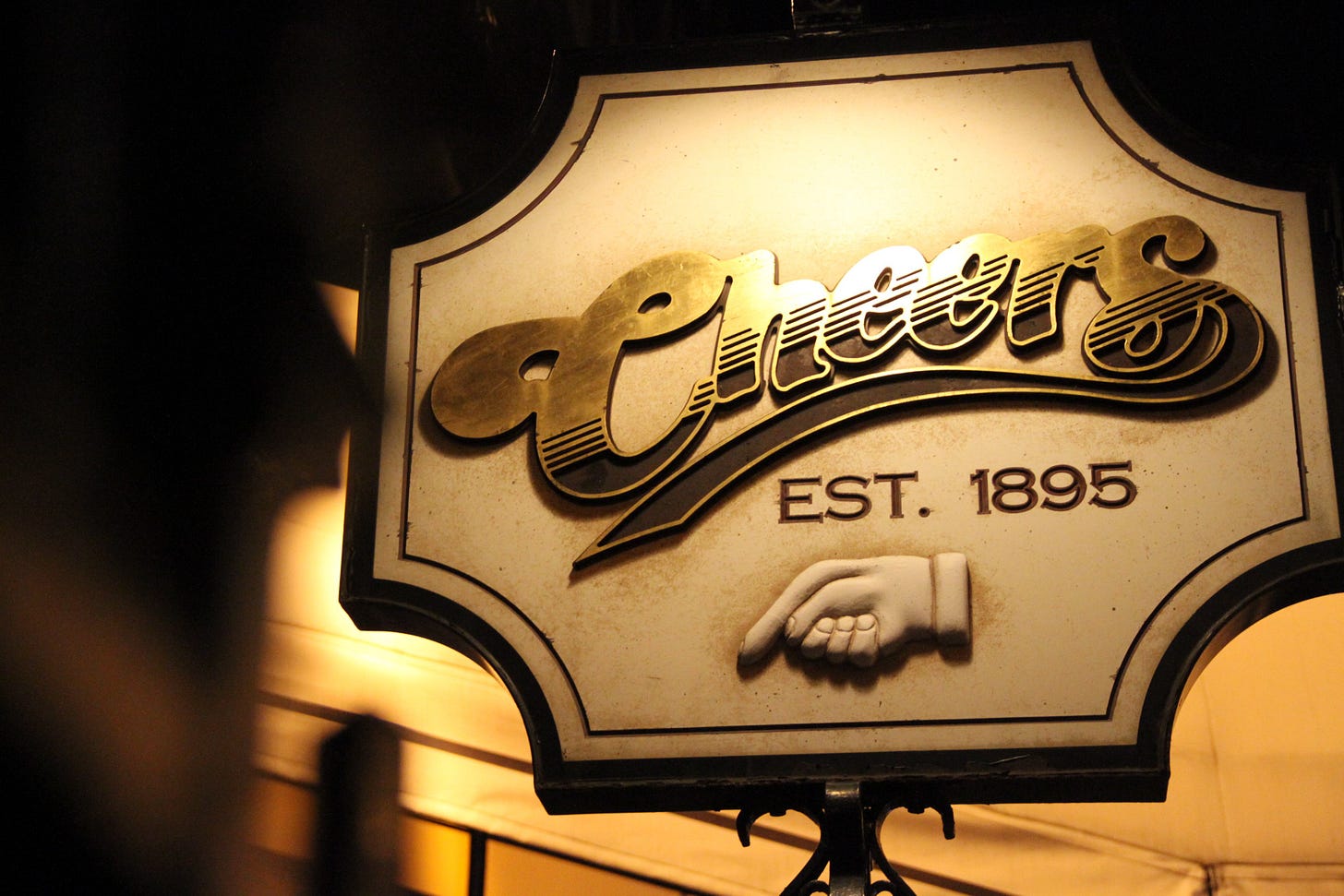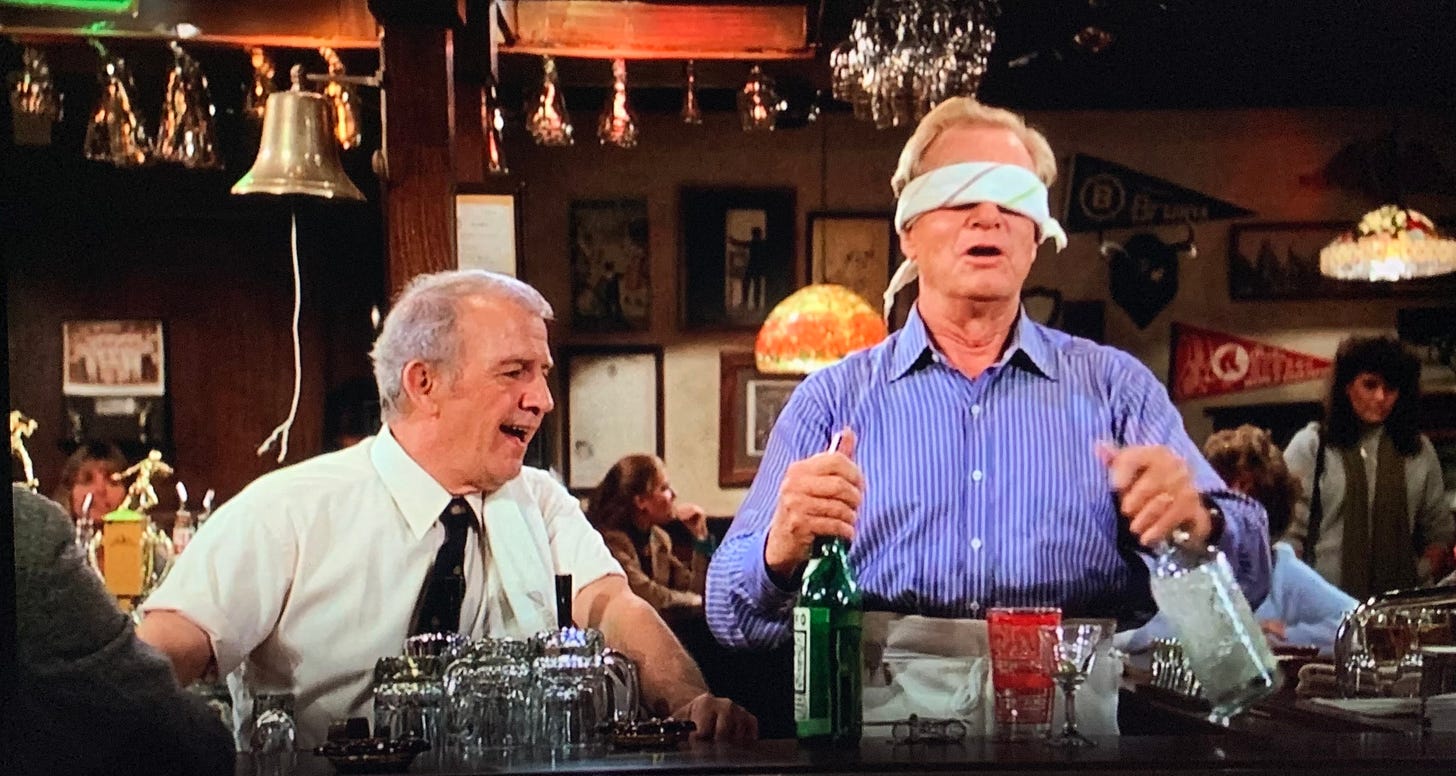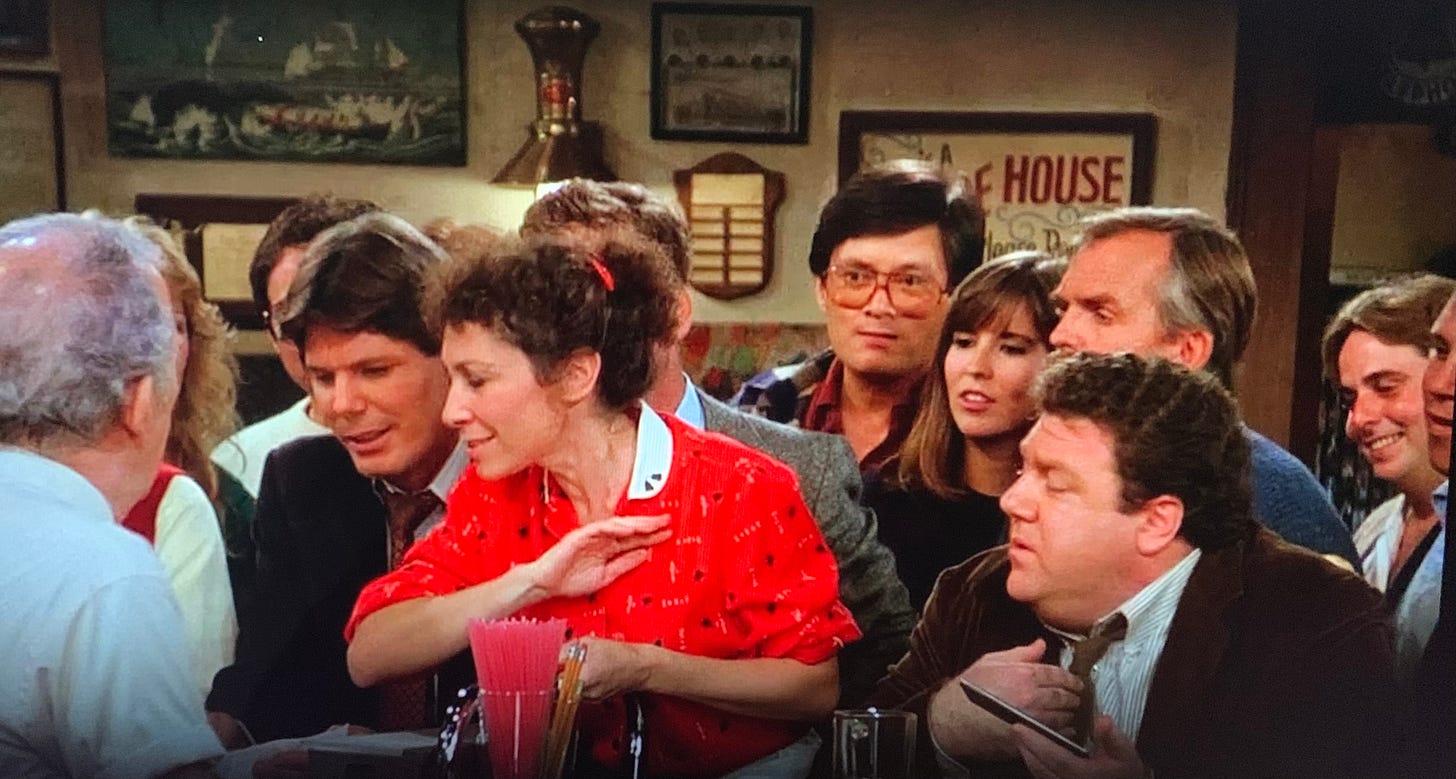Did you hear what you just said?
It's time we come back to the middle.
My wife and I started watching Cheers for the first time a few months back. It’s interesting watching a show made so long ago. What is and is not socially acceptable behavior has changed so much since the show was made. For those of you who haven’t seen Cheers, it centers around Sam Malone, a recovering alcoholic, and ex-MLB pitcher who quit drinking and opened a bar in Boston. Each episode explores the different personalities of the regulars and staff at the bar.
Last night we watched Where’s There’s a Will, season 2 episode 12. In the episode Diane, one of the waitresses and Sam’s girlfriend, is waiting on an older gentleman named Malcolm Kramer, he tells her that he just learned he only has 6 months to live. Diane, being the empathetic soul that she is, asks Sam to comfort him, Sam being the cynic that he is, ask’s Diane if it’s real or just a pickup line. Either way, Sam sits down with him to chat. Malcolm is down to earth and rational about his devastating news. He compliments Sam’s bartending skills when sipping the Hot buttered rum, and starts to reminisce about the good ole days when he bartended. Before you know it, Sam has offered to be a guest bartender for the night.
Malcolm, a Harvard businessman, whom we discover later isn’t close with his family or friends, is suddenly welcomed into this home away from home. Behind the bar, he pours beers for the regulars, Norm, and Cliff, makes bets with the other customers, washes beer mugs, and flirts with Carla. By eleven, his night is over, and he is off to catch his flight. When he bids farewell, he expresses his deepest gratitude for the wonderful act of kindness. After he is out the door Diane clings a glass and makes a speech. “What you people did this evening was magnificent, it strengthened in me a faith in humanity that gets a little shaky at times, but I want you to know that there’s nothing that I wouldn’t do for any of you.” As soon as she is finished speaking some of the lesser-known guests at the bar yell out “Hot dog” and “drop the skivvies and dance.” The bar erupts in laughter and Diane’s faith in humanity again rests on shaky ground.
Carla, the brash, foul-mouthed mother of five, and waitress finds an IOU in the tip jar and hands it over to Sam. He reads it aloud to discover that Malcolm had written a will that bequeathed to the people of Cheers $100k. What happens next shows the other side of humanity that Diane struggles to understand. They read over the will and start to fight over who gets how much based on the limited interactions they had with Malcolm over the evening. It’s pointed out that the will is not valid because it isn’t specific on who gets the money and isn’t signed by any witnesses. They decide to send Coach, Sam’s old friend, and right hand at the bar, to find Malcolm and bring him back to the bar to explain who should get the money and write a new will that is valid.
When Malcolm returns, he signs a new will but when confronted with who should get what, he pushes that problem on to Sam and signs over all the money to him. Sam, now tasked with a responsibility he didn’t ask for or want, doesn’t quite know how to handle the mob, and eventually burns the will and escapes to his office much to the disappointment of his patrons and staff. Diane, however, is proud and follows him into his office to discuss.
Before explaining the ending, I would like to take a minute to provide some foundation for the relationship that Sam and Diane have. Sam is a man’s man. He’s tall dark and handsome, before Diane, he was with a different woman every week. He is a kind soul who is a little selfish, not because he is bad but because he struggles to see things from others’ perspectives. Diane is a goody too shoe intellectual who is constantly analyzing her and others’ behavior and trying to determine what is right and what is wrong. Diane is empathetic, she can understand and feel others’ pain, while Sam is sympathetic, he can see others’ pain and understand it, but he doesn’t feel it in the same way. Diane is reserved and quiet, Sam is outgoing and loud. Sam is the Yang to Diane’s Yin and they often find each other pulling the other toward the middle. This episode would be no different.
After Sam burns the will and escapes to his office, Diane follows to discover that he tricked his friends and has the real will stuffed in his pocket. Diane is disappointed and angry to learn this. Sam’s confused at her rage, he tries to sell her the benefits, he goes on and on about all the stuff he is going to buy including a sixty-foot yacht. He tells her to think of all the good that she could do with that money. She begins to daydream about donating to environmental charities, saving endangered species, and even grabbing an expensive dress she’s been pining over. Just as Sam thinks he has her she regains herself and tells him no. They begin to fight over whether she is going to rat him out to his friends or not. She tells him “I don’t know you. I’ve never seen you like this, and I don’t like it.” He tries to convince her it’s going to make them so happy and tells her to think of all the fun they will have on the boat, then he excitedly blurts out “boy if that guy would just kick off in four months, we could have that baby in the Atlantic by spring” Diane appalled replies, “did you hear what you just said?” This is the moment when Diane begins to pull Sam back to the middle, he’s been resistant so far but now her reflection has allowed him to see himself. He may be a little selfish, but he certainly isn’t the type of guy to root for death. Sam begins to come to his senses and with a little more guilt from Diane ends up finally burning the real will.
In the 80s Diane’s voice won the battle for the middle but I wonder how a modern-day Sam and Diane would handle the corruption. Would Sam’s pressure to use the money for good persuade her? Or would her stern reason win out? Would modern-day Sam allow Diane’s reflection in or deflect her reason back at her? It got me thinking back to when I was running for Congress. I remember speaking at a PWC GOP event, there were candidates from both the 7th and the 10th there. I remember one of the candidates telling us they were the best in the field because they knew how to raise money, after all, think of all the good one could do with a high fundraising number. I thought to myself “did you just hear what you said?” I don’t remember hearing any of the good that was going to come along with it other than getting that person elected. I also don’t remember anyone in the room complaining either. While society in the 80s appears at least in part to not accept that money was the answer to solve our problems, or that it would make us happy, modern-day society seems to be at peace with the idea that with just a few more dollars we can defeat our enemies and solve our problems, then we will finally be happy. I am not saying that money isn’t a useful tool in the system, it is. I am saying that a world that rationalizes its own corruption fails to allow its reflection to be seen. Money as a tool is fine but when money becomes the object of authority its coercive powers seep deep into society’s soul.








